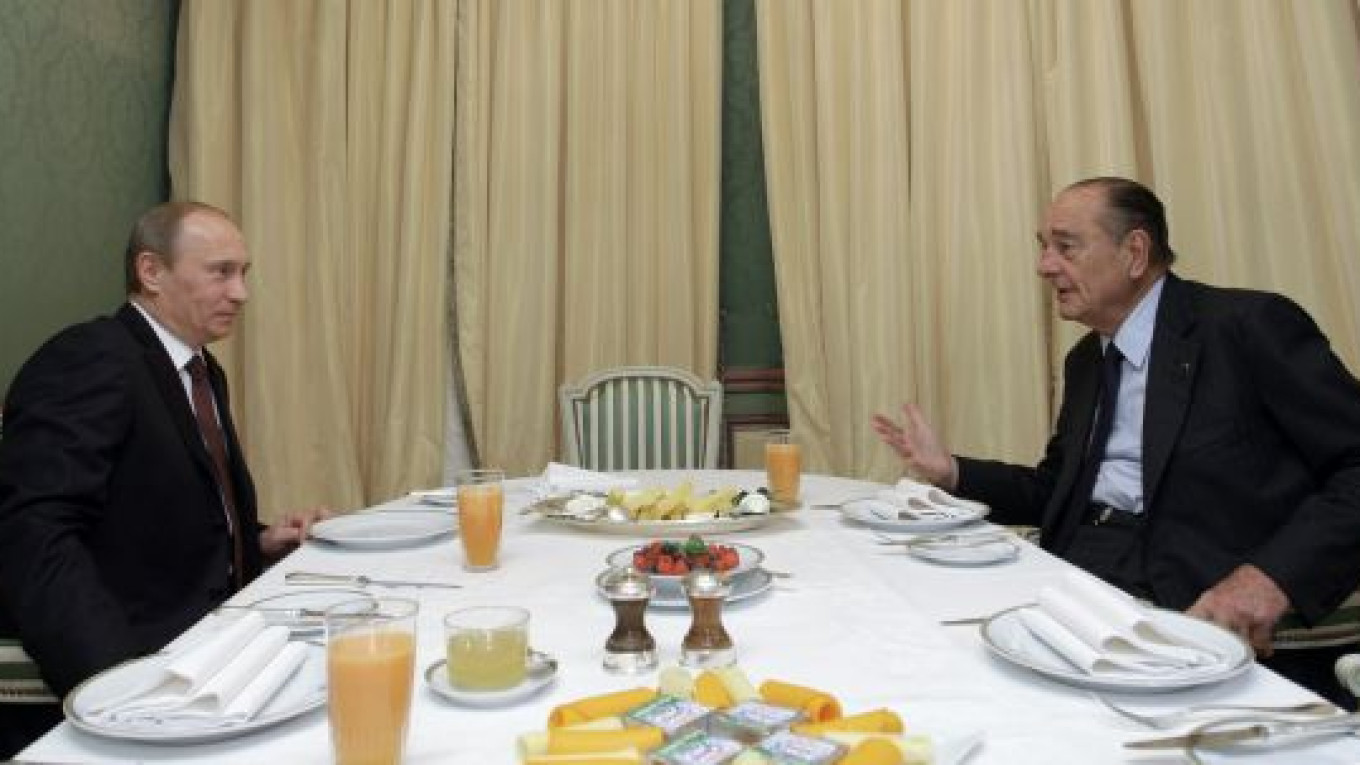French carmaker Renault agreed to step up its support of AvtoVAZ on Friday, in return for a Russian government promise to inject an additional $1.7 billion into the struggling automaker.
Prime Minister Vladimir Putin oversaw the deal on his two-day trip to Paris, where he also wrapped up a host of other deals, including signing up French participation in the South Stream pipeline (Story, Page 5).
Renault, which owns 25 percent of AvtoVAZ, will invest 300 million euros ($450 million) in the form of a technology transfer to begin production on the Renault Logan platform, according to the statement released by AvtoVAZ and its three main stakeholders.
Renault will help AvtoVAZ develop a budget model to replace the classic Zhiguli and start production of power generating units, the statement said. “Moreover, AvtoVAZ, with the help of Renault — in this case I am referring to its Japanese unit Nissan — will launch car production in the Russian Far East,” Putin said.
Nissan, part-owned by Renault, will provide 60 million euros of the total 300 million euro transfer.
While details of the proposed AvtoVAZ-Nissan plant in the Far East were not made clear, the agreement showed no cash injection into AvtoVAZ on the part of the French automaker, which, along with Nissan, will “transfer technology, equipment, know-how and expert knowledge.”
The government, meanwhile, will inject an additional 50 billion rubles ($1.7 billion) into AvtoVAZ to aid debt repayment and provide operational funding. The money comes on top of another 25 billion rubles provided by the government in June.
AvtoVAZ, operating at a loss for months partly because of a 50 percent drop in demand on the domestic market, will receive the first 12 billion rubles of government funds in January and February — the same time that Renault’s contribution will kick in, Deputy Prime Minister Igor Sechin said.
Troika Dialog, which owns 25 percent in AvtoVAZ, will gradually decrease its stake, while state holding Russian Technologies, which owns another 25 percent, and Renault will gradually increase their stakes, Russian Technologies chief Sergei Chemezov said.
“Troika Dialog’s stake will probably be diluted. Not just Troika, but other minority shareholders,” Chemezov said. Russian Technologies will increase its stake according to the amount of government funds provided, he said. Specific figures on share increases will only be available after March 1, he added.
As part of the agreement, AvtoVAZ’s market share must not drop below 25 percent, with 70 percent of that figure made up of Lada sales. By 2015, AvtoVAZ must produce 900,000 cars per year. AvtoVAZ currently has a market share of more than 25 percent, and the carmaker sold just less than 300,000 cars in the first ten months of 2009.
In addition, a total of 14,600 AvtoVAZ employees will be transferred to two recently created subsidiaries, and their salaries will be paid by the government of the Samara region, where Tolyatti-based AvtoVAZ is located.
Putin and French Prime Minister Francois Fillon oversaw the signing of a raft of agreements later Friday, including Electricite de France taking a 10 percent stake in the South Stream pipeline, and France-based Total transferring its 10 percent interest in the Kharyaga oil field to Zarubezhneft.
“When we wrapped everything up today, I have to say, that I am a bit surprised, pleasantly surprised, since I have the impression that we are seeing a certain breakthrough,” Putin said after a closed-door discussion with French Prime Minister Francois Fillon.
Putin met with Fillon after catching up with former French President Jacques Chirac over breakfast. “Many of the things that we started on together are continuing very actively today,” Putin told Chirac as the two were photographed at a table set for three in Hotel Bristol. “We are cooperating in the aviation sector, and our French partners have a 30 percent stake in one notable project, the Superjet-100,” Putin said.
Putin was vague about new agreements on overflight rights, however.
“When we arrived here, my French colleague said we are not leaving without resolving the issue of Trans-Siberian overflight,” Putin said at a joint news conference Friday. “We reached an agreement through compromise. Our partners have cooperated with our existing demands, which are of high interest to Russian companies on this market,” Putin said, without offering further details on the compromise.
The overflight fees that foreign carriers are required to pay to Aeroflot in order to use Russian airspace have been a long-standing sore point.
A Message from The Moscow Times:
Dear readers,
We are facing unprecedented challenges. Russia's Prosecutor General's Office has designated The Moscow Times as an "undesirable" organization, criminalizing our work and putting our staff at risk of prosecution. This follows our earlier unjust labeling as a "foreign agent."
These actions are direct attempts to silence independent journalism in Russia. The authorities claim our work "discredits the decisions of the Russian leadership." We see things differently: we strive to provide accurate, unbiased reporting on Russia.
We, the journalists of The Moscow Times, refuse to be silenced. But to continue our work, we need your help.
Your support, no matter how small, makes a world of difference. If you can, please support us monthly starting from just $2. It's quick to set up, and every contribution makes a significant impact.
By supporting The Moscow Times, you're defending open, independent journalism in the face of repression. Thank you for standing with us.
Remind me later.


